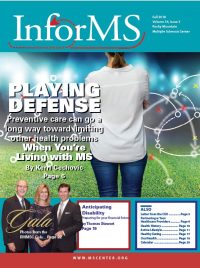Healthy eating is one of the most common pieces of advice we hear. Whether it’s your doctor, a well-meaning family member, or a relentless friend on social media, it shouldn’t be a secret to anyone that a healthy diet is central to our overall health.
As with most of the other preventive measures discussed in this issue, healthy eating is particularly important for those living with MS. A healthy diet can lower your risk for other health problems and stave off things that could complicate your MS, but healthy eating also has a much more practical benefit for those living with MS.
One of the most common symptoms of MS is fatigue, and one of the best ways to fight it is with healthy eating habits. Below are some suggestions of simple diet adjustments that may help you successfully fight the effects of fatigue.
- Try eating small, regular meals and regular snacks; for some people, more frequent mini-meals may help the body fight off fatigue and stay energized
- Plan your meals in advance so you aren’t trying to come up with something quick when you get hungry
- Don’t go more than four hours without eating something
- Stock up on ready-to-eat healthy snack items
- Keep your pantry and freezer stocked with healthy foods (pre-cut washed vegetables, canned low-sodium beans, canned tuna, low sodium canned veggies, frozen vegetables, unsalted nuts and nut butters, frozen fruit, chopped garlic)
- If you are trying to cook when you are fatigued use a tall stool so you don’t have to stand the whole time
- Make bigger batches of food and freeze some that you can have ready-to-go when you are having a low-energy day
- Consider using grocery store pick-up or delivery options: many stores including Walmart, King Soopers, Safeway, Albertsons have this, and there are also services that provide this including Instacart and Envoy.
With so much information available to us, looking for more detailed information on healthy eating can be a di cult task. So where do you start?
With the help of Holly Prehn, registered dietician at the UCHealth Center for Integrative Medicine, we’ve compiled this list of great resources and starting points.
Mayo Clinic: Healthy Recipes: www.mayoclinic.org/healthy-lifestyle/recipes
This is Mayo Clinic’s Healthy Recipes website. It gives you a variety of healthy recipes, and you can look up options based on meal, course, number of servings, preparation method, main ingredient, or special diet.
Cooking Light: Healthy Recipes: www.cookinglight.com
This is another website to check out for recipes. It has an extensive number of recipes – search for salad and you will get 1629 results. This site has a good blend of tasty but still healthy options. It also has some useful ‘how to’ videos.
USDA “MyPlate”: www.choosemyplate.gov
This is the USDA’s MyPlate site. It has a number of great features including a BMI calculator where you can plug in your height and weight and see if you are at a healthy weight. Another great tool here is the MyPlate Checklist Calculator, which you can use to calculate your calorie needs and see what foods you should be eating.
Nutrition.gov: www.nutrition.gov/subject/smart-nutrition-101/healthy-eating
This is the government’s nutrition website. It has some helpful handouts on reducing added sugars, making healthier food and beverage choices, and more.
Nutrition, Environmental Issues and Selection: A Guide from Cooking Light: www.tinyurl.com/informs-eating-1
This is a guide put out by Cooking Light to help you learn more about nutrition, environmental issues, and selection, to help you choose great fi sh. Living in Colorado, it’s important to know how to select fi sh since they are not available fresh from the dock.
Cooking Fish: A Mayo Clinic Slide Show: www.tinyurl.com/informs-eating-2
This is a slide show from the Mayo Clinic about how to cook fish.
MyFitnessPal Free Online Fitness & Food Tracker: www.myfi tnesspal.com/
If you are looking for a way to help track what you eat and stay accountable, MyFitnessPal is a great tool. It is a free online tracker with over 5 million foods in its database.
Vitamins, Minerals and Herbs in MS From the National MS Society: www.tinyurl.com/informs-eating-3
This is a detailed publication from the National MS Society that covers information on vitamins, minerals, and herbs in MS. It can help guide you with weighing out the pros and cons of dietary supplements so you can decide what is right for you. Just remember that it’s always important to discuss your supplement choices with your physician and your pharmacist to avoid medication-supplement interactions.






